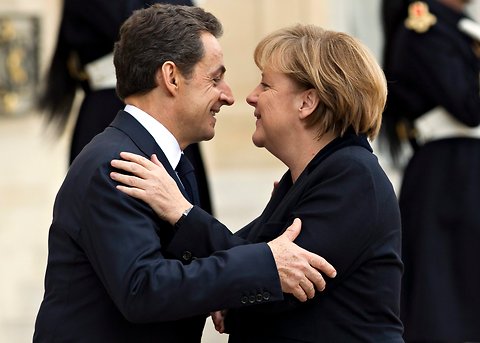 Ian Langsdon/European Pressphoto AgencyPresident Nicolas Sarkozy of France greeting Chancellor Angela Merkel of Germany on Monday.
Ian Langsdon/European Pressphoto AgencyPresident Nicolas Sarkozy of France greeting Chancellor Angela Merkel of Germany on Monday.
For weeks, attitudes toward Europe’s debt crisis have gone through a recurring cycle: markets flail, spurring leaders to gather and confer; grim-faced, they issue statements of guarded optimism and determination. Rinse. Repeat.
Below is a look back at statements from President Nicolas Sarkozy of France and Chancellor Angela Merkel of Germany over the last two months:
Oct. 7: As Germany and France try to forge a comprehensive response to Europe’s debt crisis, the two nations clash on a fundamental question. France wants to draw on the European bailout fund, the European Financial Stability Facility, to rebuild bank capital. German leaders think national governments should take the lead.

“Only if a country can’t do it on its own should the E.F.S.F. be used,” Mrs. Merkel said.
Oct. 9: Mrs. Merkel and Mr. Sarkozy met in Berlin, and said they reached a general agreement on a plan.

“It’s not the moment to go into details of all questions,” said Mr. Sarkozy.

“We are determined to do everything necessary to ensure the recapitalization of Europe’s banks,” Mrs. Merkel said.
Oct. 19: Mr. Sarkozy and Mrs. Merkel met in Frankfurt, ahead of a European summit meeting, but emphasized that a comprehensive deal was not imminent.

In a speech, Mrs. Merkel noted that the meeting would be just “one point” in “a long journey.”

“In Germany, the coalition is divided on this issue. It is not just Angela Merkel who we need to convince,” Mr. Sarkozy told French lawmakers.
Oct. 23: As concerns over high debt spread to Italy, Mr. Sarkozy and Mrs. Merkel met with the leaders of the European Union in Brussels. Tensions ran high, but little new progress was made.

Mr. Sarkozy reacted sharply to criticism from Prime Minister David Cameron of Britain, which does not use the euro. “You say you hate the euro, and now you want to interfere in our meetings,” Mr. Sarkozy said.

Mrs. Merkel reiterated her call for a comprehensive solution. “Trust will not be achieved alone through a high firewall,” she said. “Trust will not happen from a new package for Greece. Trust will only happen when everyone does their homework.”
Oct. 27: In negotiations lasting into the early morning hours, Mrs. Merkel and Mr. Sarkozy secured an agreement from banks holding Greek debt to accept a 50 percent loss on its face value.

“If there was no accord yesterday, it’s not just Europe that would face catastrophe, but the whole world,” Mr. Sarkozy said.

Mrs. Merkel said, “I believe we were able to live up to expectations, that we did the right thing for the euro zone, and this brings us one step farther along the road to a good and sensible solution.”
Nov. 10: Fears of contagion continued to grow, as Italy’s cost of borrowing continues to rise rapidly.

Mr. Sarkozy suggested that a two-tiered model for Europe was likely in the future. “There are 27 of us,” Mr. Sarkozy told French students in Strasbourg. “Clearly, down the line, we will have to include the Balkans. There will be 32, 33, 34 of us. No one thinks that federalism, total integration, will be possible with 33, 34 or 35 states,” he said.

Mrs. Merkel renewed her call for fiscal discipline and central oversight of euro member states. “It is time for a breakthrough to a new Europe,” she said. “A community that says, regardless of what happens in the rest of the world, that it can never again change its ground rules, that community simply can’t survive.”
Nov. 18: Bond yields spiked in France and Spain, raising fears that the debt crisis could freeze credit markets throughout Europe.

Mrs. Merkel’s government again said it would oppose the creation of euro zone bonds or an expanded role for the European Central Bank. “I’m convinced that none of these approaches, if applied right now, would bring about a solution of this crisis,” Bloomberg News quoted Mrs. Merkel as saying in a speech.
Nov. 24: Meeting in Strasbourg, France, with Mr. Sarkozy and Prime Minister Mario Monti of Italy, Mrs. Merkel once again rejected calls for joint euro zone bonds or more activity by the E.C.B.

“I am trying to understand Germany’s red lines,” Mr. Sarkozy said.

“Nothing has changed in my position,” said Mrs. Merkel.
Dec. 1: In an address to French citizens, Mr. Sarkozy warned that Europe could be “swept away” by the euro crisis if it does not change.

“If Europe does not change quickly enough, global history will be written without Europe,” he said. “Europe needs more solidarity and that means more discipline.”
Dec. 2: In a speech to Germany’s Parliament, Mrs. Merkel called for changing European treaties to address the underlying causes of the debt crisis.

“The future of the euro is inseparable from European unity,” she said. “The journey before us is long and will be anything but easy. But I am convinced that we are on the right path. It is the right path to take to reach our common goal: a strong Germany in a strong European Union that will benefit the people in Germany, in Europe.”
Dec. 5: Meeting in Paris, the two leaders issued a joint call for Europe’s governing treaties to be amended to bring the 17 countries of the euro zone into greater fiscal harmony.

““We want to make sure that the imbalances that led to the situation in the euro zone today cannot happen again,” Mr. Sarkozy said.

“We are absolutely determined to keep the euro as a stable currency and as an important contributor to European stability,” Ms. Merkel said.
Article source: http://feeds.nytimes.com/click.phdo?i=546949a156f652560bfc84297bc0aa72
Speak Your Mind
You must be logged in to post a comment.